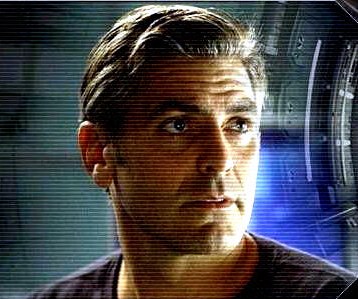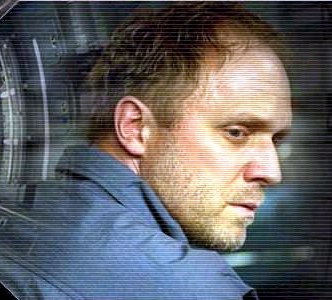Daily Dose of George Clooney
|
||
Solaris Cast Photos
|
||
 |
 George Clooney (Chris Kelvin) first collaborated with Steven Soderbergh when he starred as fugitive bank robber Jack Foley in the Oscar(R)-nominated "Out of Sight," a film adaptation of Elmore Leonard's best-selling novel. Last year, he starred as Danny Ocean in Soderbergh's retelling of the fabled 1960s film, "Ocean's Eleven." George Clooney (Chris Kelvin) first collaborated with Steven Soderbergh when he starred as fugitive bank robber Jack Foley in the Oscar(R)-nominated "Out of Sight," a film adaptation of Elmore Leonard's best-selling novel. Last year, he starred as Danny Ocean in Soderbergh's retelling of the fabled 1960s film, "Ocean's Eleven."Previously, he starred in Joel and Ethan Coen's Golden Globe(R) nominated "O Brother, Where Art Thou?" Clooney received the 2000 Golden Globe Award as Best Actor in Motion Picture - Musical or Comedy - for the film. The year before that, he starred in the box-office blockbuster "The Perfect Storm," directed by Wolfgang Petersen. Following his role in "Solaris," Clooney reteamed with the Coen Brothers in "Intolerable Cruelty."
Clooney earned unified critical acclaim for his role as Sergeant Major Archie Gates in the award-winning drama "Three Kings." His previous feature film credits include starring roles in "The Peacemaker," "Batman and Robin," the Twentieth Century Fox romantic comedy "One Fine Day" and the vampire thriller "From Dusk Till Dawn."
Television audiences are familiar with the actor for his Golden Globe, Screen Actors Guild(TM), People's Choice and Emmy(R)-nominated portrayal of Dr. Douglas Ross on "ER."
Clooney's creative inclination lies behind the camera as well. He is partnered with Steven Soderbergh in the film production company Section Eight, for which he recently made his directorial debut on the Charlie Kaufman adaptation of Chuck Barris' book "Confessions of a Dangerous Mind." Clooney also stars in the film along with Sam Rockwell, Drew Barrymore and Julia Roberts.
The actor continues to develop television projects through his Maysville Pictures. He executive produced and starred in a live television broadcast of "Fail-Safe," which was nominated for a 2000 Golden Globe Award as Best Miniseries or Motion Picture Made for Television. The Emmy-award winning telefilm was based on the early 1960's novel of the same name.
|
 Natascha McElhorn (Rheya) has starred in high-profile films opposite such acclaimed stars as Jim Carrey, Brad Pitt and Harrison Ford, since her first major role, as Francoise Gilot opposite Anthony Hopkins in Merchant/Ivory's "Surviving Picasso." Natascha McElhorn (Rheya) has starred in high-profile films opposite such acclaimed stars as Jim Carrey, Brad Pitt and Harrison Ford, since her first major role, as Francoise Gilot opposite Anthony Hopkins in Merchant/Ivory's "Surviving Picasso." The British born actress has four upcoming films scheduled for release. In director Lisa Cholodenko's "Laurel Canyon," which had its premiere at the 2002 Cannes Film Festival's Director's Fortnight, she co-stars with Frances McDormand, Christian Bale and Kate Beckinsale. In the erotic thriller "Killing Me Softly," directed by Chen Kaige ("The Assassin," "Farewell My Concubine"), she appears with Joseph Fiennes and Heather Graham. McElhone plays a do-gooder working in Cambodia who falls in love with Matt Dillon in the romantic drama "City of Ghosts." The film, which was written, directed and produced by Dillon, also stars James Caan and Gerard Depardieu.
McElhone starred opposite Jim Carrey in "The Truman Show," in which she portrayed the beautiful Lauren/Sylvia who captivated the love interest of Carrey's Truman. She also starred opposite Robert De Niro in John Frankenheimer's action adventure film "Ronin," playing a former terrorist hired to recover a mysterious briefcase for an unknown employer. Additional motion picture credits include the musical film "Love's Labour's Lost," directed by Kenneth Branagh, in which she sang and danced in an ensemble cast that included Nathan Lane and Alicia Silverstone.
She appeared in Alan Pakula's "The Devil's Own," opposite Brad Pitt and Harrison Ford, and in Marleen Gorris' critically acclaimed "Mrs. Dalloway," sharing the title role with Vanessa Redgrave.
A student at the London Academy of Music and Dramatic Art for three years before beginning her career in theater in 1993, McElhone's early stage credits include starring roles in productions of "Richard III," "The Count of Monte Cristo," "The Cherry Orchard," and "A Midsummer Night's Dream."
|
 Jeremy Davies (Snow) made his film debut in David O. Russell's "Spanking the Monkey," for which he received an Independent Spirit Award for Best Debut Performance. He also received considerable acclaim for his performance in Steven Spielberg's "Saving Private Ryan." Jeremy Davies (Snow) made his film debut in David O. Russell's "Spanking the Monkey," for which he received an Independent Spirit Award for Best Debut Performance. He also received considerable acclaim for his performance in Steven Spielberg's "Saving Private Ryan."Davies' other credits include Wim Wenders' "The Million Dollar Hotel;" Alan Rudolph's "Investigating Sex," with Nick Nolte; Phillip Haas' "Up at the Villa," with Sean Penn; J.P. Kelley's "The Locusts," with Ashley Judd; Michael Apted's "Nell" with Jodie Foster; Jan DeBont's "Twister," and Tamra Davis' "Guncrazy" with Drew Barrymore. Davies co-stars in Lars von Trier's "Dogville," opposite Nicole Kidman and Stellan Skarsgard, and starred in Roman Coppola's "CQ." He also appears in "Secretary," with James Spader and the Matthew Shepard-inspired HBO film, "The Laramie Project," with Clea Duvall, Christina Ricci and Laura Linney.
|
 Viola Davis (Gordon) is making her third appearance in a Steven Soderbergh film, following roles in the Academy Award-winning "Traffic" and "Out of Sight." Later this year, she will be seen in "Far From Heaven," written and directed by Todd Haynes, which Soderbergh executive produced. Viola Davis (Gordon) is making her third appearance in a Steven Soderbergh film, following roles in the Academy Award-winning "Traffic" and "Out of Sight." Later this year, she will be seen in "Far From Heaven," written and directed by Todd Haynes, which Soderbergh executive produced.Her additional screen credits include James Mangold's "Kate & Leopold," Richard Benjamin's "The Shrink is In," Daniel Sullivan's "The Substance of Fire," Jerry Zaks' "Marvin's Room," and the soon-to-be-released "The Antwone Fisher Story," directed by Denzel Washington.
Last year, Davis received the 2001 Antoinette Perry (Tony)(R) Award for Best Featured Actress in a Play for her performance as Tonya in August Wilson's "King Hedley II." The performance also earned her Drama Desk and Outer Critics Circle Awards. She was nominated for Tony and Drama Desk Awards for her performance as Vera in August Wilson's "Seven Guitars," which brought her an Outer Critics Circle Award as well as a Theatre World Award for Outstanding Broadway Debut.
Davis's additional stage credits include the title role in the New York Public Theatre's production of "Everybody's Ruby," for which she received an Obie(R) Award and a Drama Desk Award. She also performed in the New York Shakespeare Festival productions of "Pericles" and "As You Like It;" "God's Heart" at New York's Lincoln Center and August Wilson's "Joe Turner's Come and Gone" at the Trinity Repertory Theatre.
The actress has performed with, among other theatre companies, the American Conservatory Theatre, the Sundance Theatre Institute, and at the Williamstown Theatre Festival. Nationally, she has performed in productions at The Goodman Theatre in Chicago, The Guthrie in Minneapolis and The Huntington in San Francisco.
Davis' television work includes a regular role on the Steven Bochco-produced series "City of Angels," the "Oprah Winfrey Presents" telefilm "Amy & Isabelle" (directed by Lloyd Kramer), the Hallmark Hall of Fame telefilm "Grace and Glorie" (directed by Arthur Allan Seidelman), Richard Benjamin's telefilm "The Pentagon Wars," plus guest appearances on "The Guardian," "Judging Amy," "Third Watch," "Providence," "NYPD Blue" and "Law and Order: Criminal Intent." A graduate of The Juilliard School, Davis recently received an Honorary Doctorate of Fine Arts Degree from her alma mater, Rhode Island College.
|
 Ulrich Tukur (Gibarian) recently worked with two internationally acclaimed directors. For Costa Gavras he starred in "Amen," based on Rolf Hochhuth's "The Deputy," a film about the role of the Catholic Church during World War II and the bizarre resistance of SS man Kurt Gerstein. The film had its premiere at the 2002 Berlin Film Festival. Ulrich Tukur (Gibarian) recently worked with two internationally acclaimed directors. For Costa Gavras he starred in "Amen," based on Rolf Hochhuth's "The Deputy," a film about the role of the Catholic Church during World War II and the bizarre resistance of SS man Kurt Gerstein. The film had its premiere at the 2002 Berlin Film Festival.In "Taking Sides," directed by Istvan Szabo, Tukur co-stars with Harvey Keitel and Stellan Skarsgard in a film based on the stage play by Ronald Harwood. "Taking Sides" examines the decision by noted German symphony conductor Wilhelm Furtwangler to remain in Germany under the Nazi regime. The film premiered at the 2001 Toronto Film Festival.
Since making his motion picture debut in Michael Verhoeven's "The White Rose" in 1982, Tukur has appeared in over two dozen German films, including "Bonhoeffer-Agent of Grace," "Tears of Stone," "Charms," "My Mother's Courage," "The Last U-Boat," "Democratic Terrorist" and "Mystery of the Amber Room."
He made his professional stage debut in 1984 in "Ghetto," directed by Peter Zadek in Berlin. His performance earned him the O.E. Hasse Award from the Academy of Fine Arts.
A noted Shakespearean actor, Tukur has also performed in Germany in "Measure for Measure," "As You Like It," "Julius Caesar," "Hamlet," and "Macbeth." He received the Boy Gobert Award from the Hamburg State Theatres in 1985 for his role as Orlando in "As You Like It." The following year he was awarded the Best Actor Award from the German Theatre Critics for his roles in "Julius Caesar," Sam Shepard's "Fool For Love" and "Ghetto."
Among his other stage credits are J.P. Donleavy's "The Ginger Man," Ibsen's "Peer Gynt" and Hofmannsthal's "Everyman," which he performed during the 1999, 2000 and 2001 Salzburg Festivals.
For his work in television, Tukur received the 1996 Golden Camera Award for the film "The Killer and His Child" and the Adolf Grimme Award (Germany Emmy) in 2000 for his role in the television movie "Waiting is Death," Born in Viernheim, Germany, Tukur grew up in Westphalia and Lower Saxony. He studied at the Stuttgart School of Music and Dramatic Arts and since 1985 he has been a member of the Hamburg State Theatre.
A talented singer, musician and composer, Tukur has performed in small venues playing piano and accordion. He released his first record, "Tanzpalast," in 1990. In 1993, he produced, starred in and wrote the libretto for "Blue Beard's Orchestra" at the Schmidt's Tivoli Theatre in Hamburg. In 1997 he produced, starred in and wrote the libretto for a second musical, a romance entitled "To Once Be Casanova."
In 1995, along with director Ulrich Waller, he was made artistic director of the Hamburg Kammerspiele Theatre.
Tukur's band, Ulrich Tukur and The Rhythmus Boys has performed in clubs throughout Germany and Austria. Their first recording "I Long for the Bar at the Beach" was released in 1997, followed by "Wonderful To Be With You," released in 2001.
|
 Director Steven Soderbergh's creative impulses, recently on display in the blockbuster film "Ocean's Eleven" and the independent comedy "Full Frontal," had not yet led him to the realm of science fiction. "I hadn't ever come near sci fi before, mostly because the hardware aspects of the genre don't really interest me," he explains. "I'm not interested in making a film about what technology is going to be like a few decades from now." Director Steven Soderbergh's creative impulses, recently on display in the blockbuster film "Ocean's Eleven" and the independent comedy "Full Frontal," had not yet led him to the realm of science fiction. "I hadn't ever come near sci fi before, mostly because the hardware aspects of the genre don't really interest me," he explains. "I'm not interested in making a film about what technology is going to be like a few decades from now."Soderbergh considered turning to the genre only after a friend at Twentieth Century Fox had pitched him the idea of making a new film based on Stanislaw Lem's classic novel Solaris. Shortly thereafter, Soderbergh learned that filmmaker James Cameron and his associates at Lightstorm Entertainment, Rae Sanchini and Jon Landau, held the rights to the seminal work. Lightstorm had spent five years securing deals with both the author and the Russian governmental organization Mosfilm, which owns the 1972 Russian film based on the novel, directed by Andrei Tarkovsky.
For James Cameron, turning Solaris into a film was a dream project. Cameron had seen Andrei Tarkovsky's film, finding much to admire in its imagery and ideas. Stanislaw Lem's novel intrigued him even more. "It had a whole other dimension," notes Cameron. "It's a very personal story. Much of it takes place in the mind and in the memory, so you could find many different ways to interpret it. "
Cameron was thrilled when Soderbergh expressed interest in directing SOLARIS. "It was like a godsend when we heard that Steven wanted to make this film," Cameron says. "I knew he could take this material and turn it into a film that people could talk about for a long time after they've seen it, because there are some fascinating ambiguities. Steven could give audiences lots of handles to grab onto, to become involved in.
"Steven's films are very, very different and unique from one another in the way that Kubrick's films are different from each other," Cameron adds. "He is extremely chameleon-like in that way so I thought, 'Wouldn't you like to see Steven tackle this kind of dense, complex material?'"
Soderbergh met with Cameron, Landau and Sanchini over dinner to discuss SOLARIS. "I told them I had an idea of how to do this," Soderbergh recalls, "but I wanted to write the screenplay on spec; I didn't want to make a deal to do it. I explained my approach and what I wanted to focus on and the ways in which I thought it would be different from the book and from Tarkovsky's movie."
As Soderbergh was completing work on "Traffic," he turned in a first draft of SOLARIS to Lightstorm. Another draft followed, after which Soderbergh and Lightstorm were ready to approach Twentieth Century Fox and make the movie.
"This was Steven's ballgame from the get-go," says Cameron. "I felt I've learned more from Steven than he's learned from me on this film. He went off and wrote the script, essentially in a vacuum. We didn't tell him what we thought it should be. We didn't sit down and talk about whether it should be an effects film, or not. We just waited to see what he came back with. His initial script blew us away.
"We all had to be experts on what Steven was trying to do. It was a question of learning the movie that Steven wanted to make, and being his sounding board within a framework that was meaningful to him."
While Soderbergh had a specific vision for the film, he readily embraced Cameron's input. "Jim Cameron knows narrative backwards and forwards," Soderbergh notes. "He really understands how to set up and pay off a story. I would meet with him about SOLARIS and we would have three-hour conversations about the story, about technology, about what the future is going to be like, about space travel, and issues like isolation and sensory deprivation, because he's studied all of it. I would tape record our conversations and transcribe them and highlight things that I thought could find their way into the film, whether it was a sentence or an idea - anything I thought might stick."
"There were a hundred different versions of SOLARIS we could have legitimately told, but what was critical to us was that the central themes remain intact," adds Rae Sanchini. "Our entire focus throughout development and production has been to make sure that we never lose sight of the essence of the story."
*****
To date, STEVEN SODERBERGH is the only director to have two films nominated for Best Picture and Best Director in the same year. His Academy Award(R) for Best Director of "Traffic" marks the first time since the 1928/29 Awards that a director has successfully competed against himself (Frank Lloyd for "Divine Lady". Michael Curtiz, a double nominee for Best Director in 1938 for "Angels With Dirty Faces" and "Four Daughters" lost to Frank Capra for "You Can't Take It With You").
"Traffic," a contemporary thriller set against the backdrop of the United States' on-going drug wars, also received Oscars(R) for Editing (Stephen Mirrione), Supporting Actor (Benicio del Toro) and Adapted Screenplay (Stephen Gaghan). The film's fifth nomination was for Best Picture (Laura Bickford, Marshall Herskovitz, Edward Zwick). "Traffic" has grossed over $124,000,000 domestically, bringing its worldwide total to over $200 million.
In addition to Soderbergh's Best Director nomination for "Erin Brockovich," Julia Roberts received the Best Actress Academy Award for the title role in the true story of a California single mother who takes on a power company in a direct-action suit and brings it to its knees. The film's other nominations were for Best Supporting Actor (Albert Finney), Best Original Screenplay (Susannah Grant) and Best Picture (Danny DeVito, Michael Shamberg, Stacey Sher).
Last year, Soderbergh directed a retelling of "Ocean's Eleven," the fabled 1960's film which firmly established the Rat Pack in the American lexicon. Since it's December release the film, which stars George Clooney, Matt Damon, Andy Garcia, Brad Pitt, Julia Roberts, Casey Affleck, Scott Caan, Don Cheadle, Elliott Gould, Eddie Jemison, Bernie Mac, Carl Reiner and Shaobo Qin, has grossed over $435,000,000 worldwide.
In August, Miramax released Soderbergh's contemporary comedy "Full Frontal." Starring David Duchovny, Nicky Katt, Catherine Keener, Mary McCormack, David Hyde Pierce, Julia Roberts and Blair Underwood, the movie was shot during eighteen days using a combination of digital video tape and film.
SOLARIS is Soderbergh's thirteenth film following "Full Frontal," "Ocean's Eleven," "Traffic," "Erin Brockovich," "The Limey," "Out of Sight," "Gray's Anatomy," "Schizopolis," "The Underneath," "King of the Hill," "Kafka" and "sex, lies, and videotape."
In addition to his credits as director, Soderbergh functioned as producer on Greg Mottola's "The Daytrippers" (1997) and on Gary Ross' "Pleasantville" (1998). As well, he served as the executive producer on David Siegel and Scott McGehee's "Suture" (1994) and on Godfrey Reggio's upcoming "Naqoyqatsi," the final installment of the non-narrative films that make up the Qatsi Trilogy, beginning with "Koyaanisqatsi" and "Powaqqatsi".
In 2000, Soderbergh and George Clooney formed Section Eight, a film production company based at Warner Bros. Their ensemble comedy, "Welcome to Collinwood," written and directed by brothers Anthony and Joe Russo, was selected to close the 2002 Cannes Film Festival's Director's Fortnight. The film's cast includes William H. Macy, Isaiah Washington, Luis Guzman, Jennifer Esposito, Sam Rockwell and Clooney.
They recently completed work on Charlie Kaufman's adaptation of Chuck Barris' book "Confessions of a Dangerous Mind," directed by and starring George Clooney with a cast that includes Sam Rockwell, Drew Barrymore and Julia Roberts. They are also in post-production on an untitled film written and directed by Lodge Kerrigan.
Soderbergh and Clooney also executive produced "Insomnia," directed by Christopher Nolan and starring Al Pacino, Robin Williams and Hilary Swank and "Far From Heaven," written and directed by Todd Haynes.
|